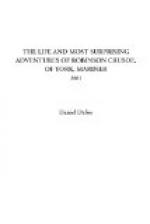The next concern I had was to get me a stone-morter to beat some corn in, instead of a mill to grind it. Here indeed I was at a great loss, as not being fit for a stone-cutter; and many days I spent to find out a great stone big enough to cut hollow and make fit for a morter, and strong enough to bear the weight of a pestil, and that would break the corn without filling it with sand. But all the stones of the island being of a mouldering nature, rendered my search fruitless; and then I resolved to look out for a great block of hard wood, which having found, I formed it with my ax and hammer, and then, with infinite labour, made a hollow in it, just as the Indians of Brazil make their canoes. When I had finished this, I made a great pestil of iron wood, and then laid them up against my succeeding harvest.
My next business was to make me a sieve, to sift my meal and part it from the bran and husk. Having no fine thin canvas to search the meal through, I could not tell what to do. What linen I had was reduced to rags: I had goat’s hair, enough, but neither tools to work it, nor did I know how to spin it: At length I remembered I had some neckcloths of calico or muslin of the sailors, which I had brought out of the ship, and with these I made three small sieves proper enough for the work.
I come now to consider the baking part. The want of an oven I supplied by making some earthen pans very broad but not deep. When I had a mind to bake, I made a great fire upon the hearth, the tiles of which I had made myself; and when the wood was burnt into live coals, I spread them over it, till it became very hot; then sweeping them away, I set down my loaves, and whelming down the earthen pots upon them, drew the ashes and coals all around the outsides of the pots to continue the heat; and in this manner I baked my barley loaves, as well as if I had been a complete pastry-cook, and also made of the rice several cakes and puddings.
It is no wonder that these things took me up the best part of a year, since what intermediate time I had was bestowed in managing my new harvest and husbandry; for in the proper season I reaped my corn, carried it home, and laid it up in the ear in my large baskets, til I had time to rub, instead of thrashing it. And now, indeed, my corn increased so much, that it produced me twenty bushels of barley, and as much rice, that I not only began to use it freely, but was thinking how to enlarge my barns, and resolved to sow as much at a time as would be sufficient for me for a whole year.
All this while, the prospect of land, which I had seen from the other side of the island, ran in my mind. I still meditated a deliverance from this place, though the fear of greater misfortunes might have deterred me from it.—For, allowing that I had attained that place, I run the hazard of being killed and eaten by the devouring cannibals: and if they were not so, yet I might be slain, as other Europeans had been, who fell into their hands.




